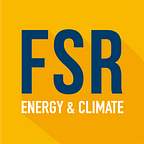Colombia advances its energy transition
The country looks to non-conventional sources of renewable energy to reduce its dependence on hydropower.
Podcast with Alexandra Planas & Juan Carlos Cárdenas
This interview was created under the partnership between the FSR Lights on Women initiative & the Inter-American Development Bank: Learn more about the Lights on Women Latin American and Caribbean (LAC) Edition.
Colombia continues reforming its electric sector to improve and expand service, reduce vulnerability to climate change and diversify the energy matrix by incorporating more non-conventional renewable sources (including solar, wind and biogas). According to Alexandra Planas — Senior Energy Specialist at the Inter-American Development Bank — “the use of Non-conventional sources of renewable energy has been growing steadily in the last decade, but still only represents one percent of the total energy matrix in Colombia”, therefore the reforms are necessary to secure the energy transition in the country and to increase the share of Non-conventional energy to 15–18% by 2031.
Tune into the podcast!
Read more on the topic! Press release: Colombia will improve and expand electricity supply throughout the country with IDB support (in Spanish)
Alexandra Planas is the Senior Energy Specialist for Colombia at the Inter-American Development. She has more than 15 years of experience in the energy sector and interrelated sectors such as environment, climate change, regional integration and institutional strengthening, including 15 years of experience working at the World Bank in the Latin America, Africa and South Pacific regions. She has worked in the planning, preparation, negotiation and execution of energy projects, as well as in the development of knowledge in the areas of generation, transmission, rural electrification, regional interconnections and energy efficiency financed by the public sector, public-private initiatives and the private sector with guarantees from the nation. Alexandra holds a Master’s degree in International Economics with specialisation in energy and environment from the Johns Hopkins University in the United States.
Juan Carlos Cárdenas is an Energy Economist Consultant at the Inter-American Development Bank in Washington D.C. He has more than 10 years of experience working in the energy sector and provides technical and operational support to the portfolio of energy projects in Latin America and the Caribbean. His work focuses on promoting the use of renewable energies, access to energy and energy policy reforms. Prior to coming to the IDB, he worked at the Work Bank’s Global Energy and Extractive Practice in Washington D.C., and the Energy Group of Bogotá. Juan Carlos holds a Master’s Degree in Public Administration (MPA) from the School of International and Public Affairs of Columbia University, and a Master’s Degree in Economics from the National University of Colombia.
Join the Lights on Women Community:
Subscribe to our mailing list for updates and opportunities!
